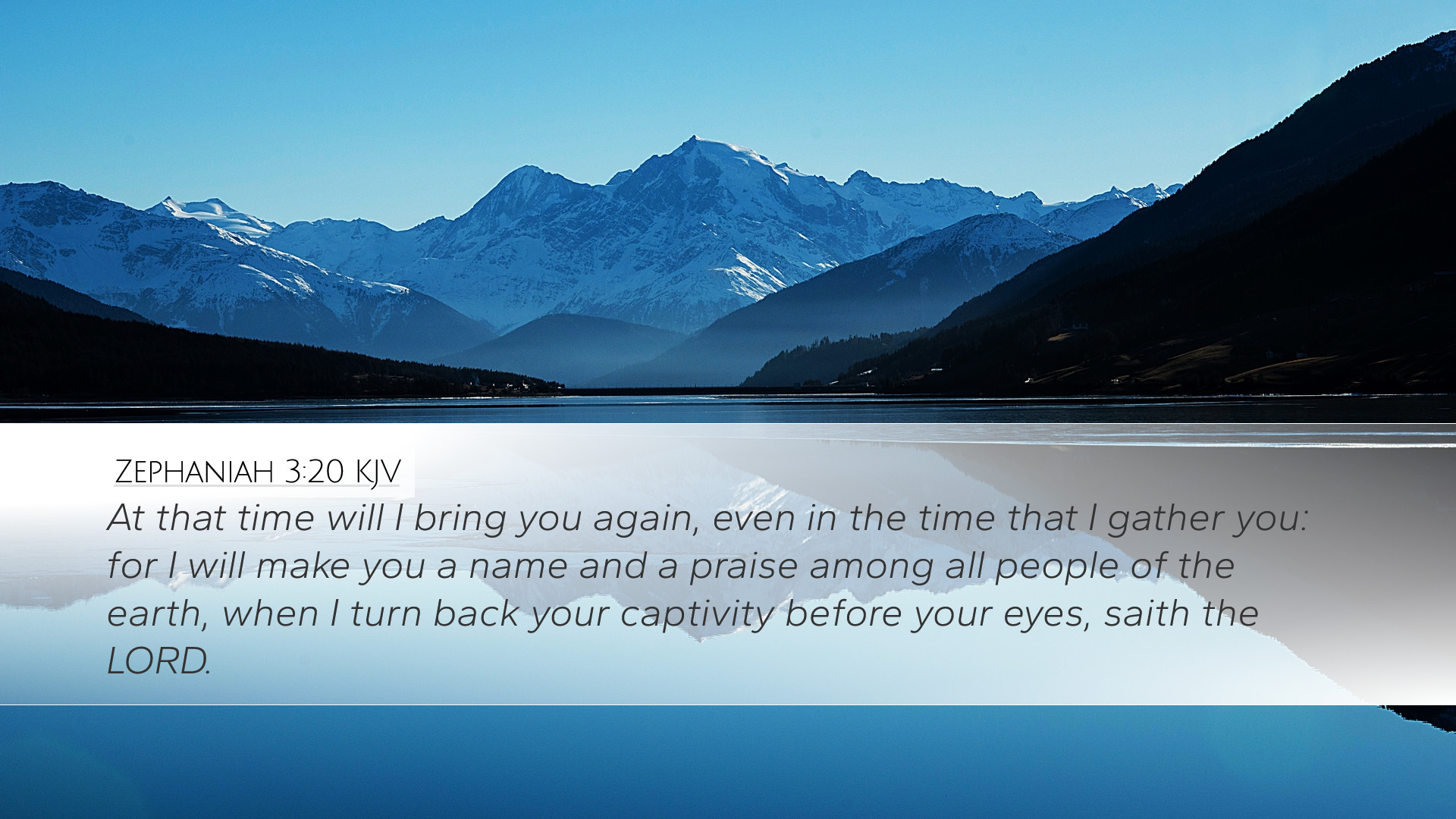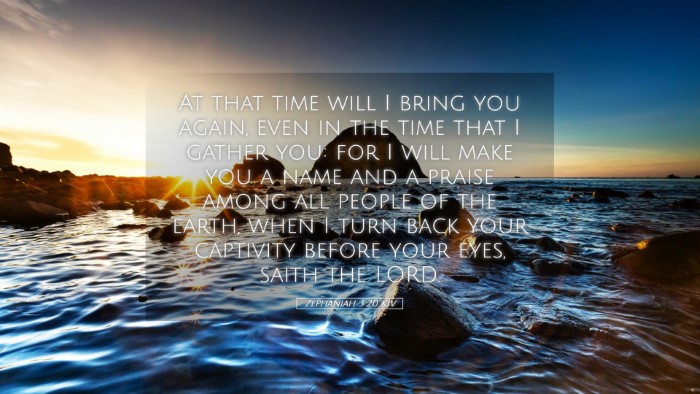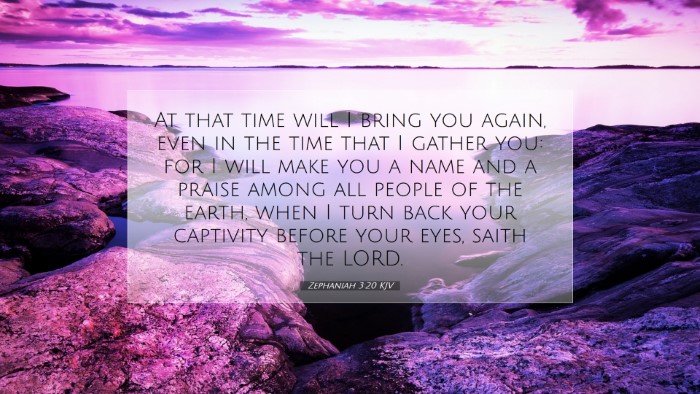Old Testament
Genesis Exodus Leviticus Numbers Deuteronomy Joshua Judges Ruth 1 Samuel 2 Samuel 1 Kings 2 Kings 1 Chronicles 2 Chronicles Ezra Nehemiah Esther Job Psalms Proverbs Ecclesiastes Song of Solomon Isaiah Jeremiah Lamentations Ezekiel Daniel Hosea Joel Amos Obadiah Jonah Micah Nahum Habakkuk Zephaniah Haggai Zechariah MalachiZephaniah 3:20
Zephaniah 3:20 KJV
At that time will I bring you again, even in the time that I gather you: for I will make you a name and a praise among all people of the earth, when I turn back your captivity before your eyes, saith the LORD.
Zephaniah 3:20 Bible Commentary
Commentary on Zephaniah 3:20
Verse Text: "At that time I will bring you in, and at the time when I gather you; for I will make you a name and a praise among all the peoples of the earth, when I restore your fortunes before your eyes," says the Lord.
Introduction
Zephaniah, a minor prophet, delivers messages of judgment and hope during a pivotal time in Israel's history, emphasizing the impending doom facing Judah due to their idolatry and corruption. However, woven through his dire prophecies is the thread of God's ultimate restoration and mercy. Zephaniah 3:20 resonates as a profound declaration of hope, affirming God’s promise to restore His people.
Exegesis of Zephaniah 3:20
This verse stands at the culmination of the prophetic message, where God reassures His people of His faithfulness. The structure of this verse can be divided into several key elements:
- Promise of Restoration: "At that time I will bring you in..." indicates God’s initiative in restoring His people, highlighting divine sovereignty and grace.
- Gathering of the Exiles: "...at the time when I gather you;” emphasizes the communal aspect of God's plan - He is concerned with the entire nation and its collective future.
- Establishment of a Reputation: "...for I will make you a name and a praise among all the peoples..." signifies God’s intention to elevate His people as a testimony of His goodness, a theme echoed throughout scripture. This underscores not just restoration but glorification.
- Visible Restoration: "...when I restore your fortunes before your eyes," conveys a promise that this restoration will be evident and tangible, making it clear that God fulfills His promises visibly.
Insights from Commentators
Matthew Henry
According to Matthew Henry, this verse speaks profoundly of God’s grace and the assurance of restoration for those who remain faithful. He emphasizes that God, being a God of mercy, will not forsake His people. Henry notes that the phrase "I will bring you in" suggests not just physical return but a deeper spiritual restoration as well. God’s intimate involvement in gathering His people reveals His everlasting love and commitment.
Albert Barnes
Albert Barnes elaborates on the context of exile and the longing for return prevalent in Zephaniah's message. He highlights that the prophecy extends beyond mere national restoration; it foreshadows the enduring character of God's promise. Barnes points out that "a name and a praise" implies a transformative change that elevates the status of Israel in the sight of other nations. This paradigm shift exemplifies God's redemptive power and the fulfillment of His covenant with Israel.
Adam Clarke
Adam Clarke draws attention to the temporal aspect of the fulfillment. He asserts that God's timing is perfect and that the restoration will occur when the conditions align with His divine will. Clarke emphasizes that the restoration mentioned denotes both spiritual and temporal blessings, thereby underscoring the holistic nature of God’s redemptive plan. He presents a theological reflection on how this verse encapsulates the entirety of salvation history, from judgment to ultimate restoration.
Theological Reflections
Zephaniah 3:20 serves as a microcosm of the overarching biblical narrative of hope amid judgment. It illustrates the balance of God’s justice and mercy, portraying Him as a covenant-keeping God who delights in restoring His people.
- The Nature of God’s Promises: This verse assures believers of God's fidelity to His promises, encouraging faith in His ability to restore and renew.
- The Role of Community: The gathering implies God’s intent to unite His people, highlighting the significance of communal identity in faith.
- Hope for the Future: Pastors and theologians can draw practical applications from this verse regarding the hope for individuals and communities facing challenges—encouraging faith amidst seeming hopelessness.
Conclusion
In summary, Zephaniah 3:20 encapsulates a profound message of hope and restoration, indicative of God’s character and His faithfulness to His people. It prompts reflection on God's redemptive work in history and our present lives, reminding us that God sees our struggles and has a divine plan for our restoration. For pastors, students, and theologians, this verse serves as a source of encouragement to proclaim the hopeful message of the Gospel, emphasizing that no matter the judgment faced, God has the ultimate power to restore and redeem His people.


